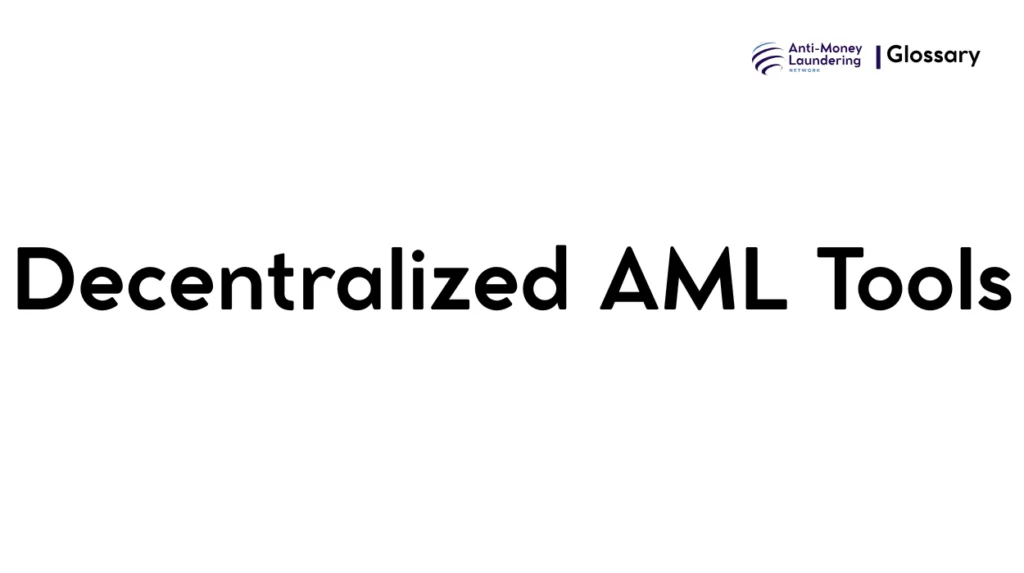Definition
Decentralized Anti-Money Laundering (AML) tools are digital technologies designed to detect, monitor, and prevent money laundering activities specifically within decentralized financial systems. These tools operate across decentralized platforms, including blockchain networks and decentralized finance (DeFi) protocols, enabling compliance officers and financial institutions to manage money laundering risks in environments lacking centralized intermediaries.
Purpose and Regulatory Basis
Decentralized AML tools play a crucial role in combating illicit financial activities in the growing decentralized ecosystem. Unlike traditional financial systems regulated centrally, decentralized platforms present unique challenges for AML compliance due to anonymity, pseudonymity, and lack of central control.
Global and national regulations mandate AML compliance to protect financial integrity. Key frameworks influencing decentralized AML tools include:
- Financial Action Task Force (FATF): Provides recommendations that apply to virtual asset service providers (VASPs) and calls for ‘Travel Rule’ compliance connecting originators and beneficiaries.
- USA PATRIOT Act: Extends AML obligations to institutions dealing with cryptocurrencies.
- European Union Anti-Money Laundering Directives (AMLD): Sets AML standards incorporating digital assets and decentralized finance.
These regulations compel the development and deployment of AML tools capable of transaction monitoring, customer due diligence, and suspicious activity reporting within decentralized environments.
When and How it Applies
Decentralized AML tools are applied whenever financial transactions occur on decentralized networks, notably:
- Onboarding and verifying users on decentralized exchanges (DEXs).
- Monitoring peer-to-peer cryptocurrency transactions.
- Risk-scoring wallet addresses engaging with DeFi services.
- Detecting illicit fund flows through decentralized applications.
For example, a crypto exchange employing decentralized AML tools may flag a transaction moving funds from a wallet linked to darknet markets, triggering further investigation and possible reporting.
Types or Variants
There are several forms of decentralized AML tools, including:
- Transaction Monitoring Systems: Continuously analyze blockchain transactions to detect suspicious patterns.
- Wallet Address Screening Tools: Identify links between wallet addresses and illicit entities.
- Risk Scoring Engines: Use AI/ML to assess overall risk levels of addresses or transactions.
- Identity Verification Mechanisms Adapted for DeFi: Facilitate pseudonymous identity vetting.
Each variant helps address different AML challenges presented by decentralized finance.
Procedures and Implementation
Implementing decentralized AML tools involves:
- Integration with Blockchain Networks: Accessing transaction data in real-time via APIs or nodes.
- Customer Due Diligence (CDD) Adaptations: Using decentralized identity or on-chain behavior to perform risk assessments.
- Real-Time Transaction Monitoring: Applying algorithmic rules and machine learning to flag anomalies.
- Alert Management and Reporting: Creating workflows to investigate and report suspicious activities per regulatory requirements.
- Continuous Review and Updates: Adapting detection parameters as new laundering tactics emerge.
Financial institutions must establish systems controls that balance decentralization’s openness with regulatory compliance.
Impact on Customers/Clients
From customers’ perspectives, decentralized AML tools may:
- Introduce additional verification steps on decentralized platforms.
- Enable better protection from fraudulent activities.
- Impose transaction restrictions if suspicious activity is detected.
- Require sharing of some personal or transactional data in otherwise pseudonymous environments.
These effects underscore the tension between privacy and compliance in decentralized finance.
Duration, Review, and Resolution
Financial institutions must maintain AML oversight continuously, reviewing system effectiveness regularly. Transaction alerts and investigations may span from hours to weeks depending on complexity. Institutions have ongoing obligations to update AML procedures to counter evolving risks and ensure compliance.
Reporting and Compliance Duties
Institutions deploying decentralized AML tools bear responsibilities such as:
- Documenting monitoring processes and decisions.
- Filing Suspicious Activity Reports (SARs) with authorities when warranted.
- Maintaining audit trails of transactions and investigations.
- Ensuring staff training on decentralized AML controls.
Failing to comply risks regulatory penalties and reputational damage.
Related AML Terms
Decentralized AML tools connect closely with terms like:
- **Know Your Customer (KYC)
- Suspicious Activity Reporting (SAR)
- Virtual Asset Service Providers (VASPs)
- Blockchain Analytics
- Transaction Monitoring
Understanding these interrelations aids comprehensive AML strategies.
Challenges and Best Practices
Challenges in decentralized AML include:
- Lack of centralized data for full transparency.
- Difficulty linking pseudonymous addresses to real-world identities.
- Rapidly evolving technologies and laundering techniques.
- Balancing user privacy with regulatory demands.
Best practices involve leveraging advanced analytics, collaborating with regulators, continuous staff training, and adopting adaptive risk-based approaches.
Recent Developments
Emerging trends in decentralized AML include:
- Use of AI and machine learning for enhanced pattern detection.
- Development of cross-chain monitoring tools to track transactions across different blockchains.
- Regulatory updates emphasizing ‘Travel Rule’ enforcement in DeFi.
- Industry collaborations to share data and threat intelligence.
These developments aim to strengthen AML compliance while preserving the decentralized ethos.
Decentralized AML tools are essential instruments enabling compliance officers and financial institutions to mitigate money laundering risks in decentralized finance ecosystems. Rooted in global AML frameworks, they provide innovative solutions tailored to the distinctive challenges of decentralization. Staying abreast of regulatory requirements and technological advances is crucial for effective AML compliance in the evolving financial landscape.

